人教八年级英语上册Unit2单元教案
英语教案人教版八年级英语上册Unit 2 How often do you exercise
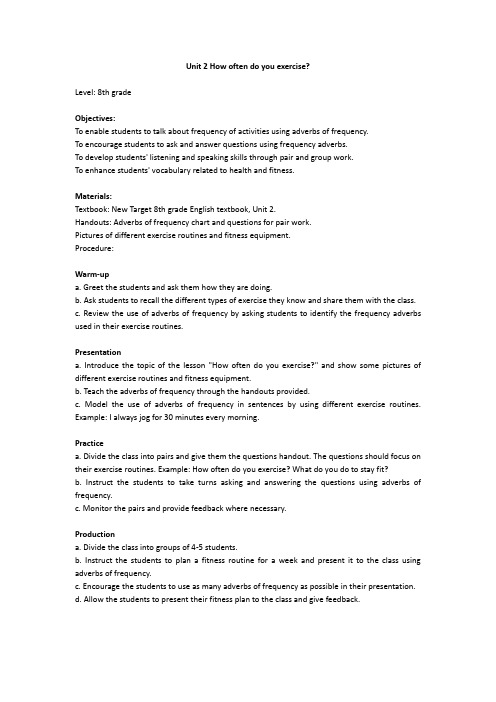
Unit 2 How often do you exercise?Level: 8th gradeObjectives:To enable students to talk about frequency of activities using adverbs of frequency.To encourage students to ask and answer questions using frequency adverbs.To develop students' listening and speaking skills through pair and group work.To enhance students' vocabulary related to health and fitness.Materials:Textbook: New Target 8th grade English textbook, Unit 2.Handouts: Adverbs of frequency chart and questions for pair work.Pictures of different exercise routines and fitness equipment.Procedure:Warm-upa. Greet the students and ask them how they are doing.b. Ask students to recall the different types of exercise they know and share them with the class.c. Review the use of adverbs of frequency by asking students to identify the frequency adverbs used in their exercise routines.Presentationa. Introduce the topic of the lesson "How often do you exercise?" and show some pictures of different exercise routines and fitness equipment.b. Teach the adverbs of frequency through the handouts provided.c. Model the use of adverbs of frequency in sentences by using different exercise routines. Example: I always jog for 30 minutes every morning.Practicea. Divide the class into pairs and give them the questions handout. The questions should focus on their exercise routines. Example: How often do you exercise? What do you do to stay fit?b. Instruct the students to take turns asking and answering the questions using adverbs of frequency.c. Monitor the pairs and provide feedback where necessary.Productiona. Divide the class into groups of 4-5 students.b. Instruct the students to plan a fitness routine for a week and present it to the class using adverbs of frequency.c. Encourage the students to use as many adverbs of frequency as possible in their presentation.d. Allow the students to present their fitness plan to the class and give feedback.Conclusiona. Summarize the lesson by asking the students to recall the use of adverbs of frequency.b. Ask the students to share what they have learned in the lesson.c. Assign homework, which could be to write a paragraph about their own exercise routine using adverbs of frequency.Assessment:The teacher can assess the students' understanding of the lesson through their participation in the pair and group work. The students' use of adverbs of frequency and their ability to ask and answer questions will be evaluated. The homework assigned will also be assessed for the students' use of adverbs of frequency.。
【人教版】新目标八年级英语上册:Unit 2 单元教学设计
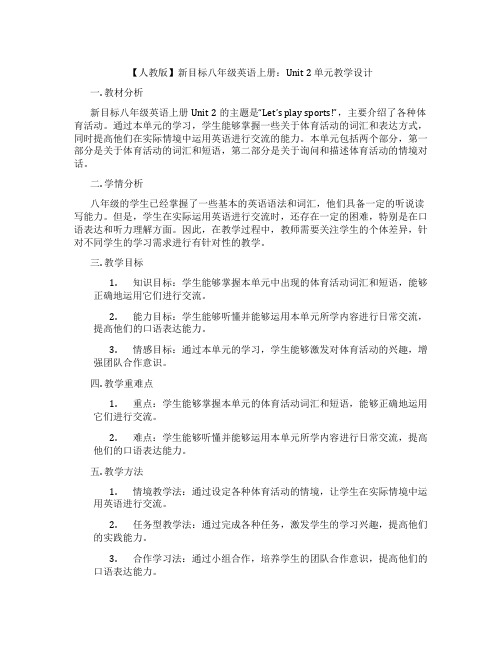
【人教版】新目标八年级英语上册:Unit 2 单元教学设计一. 教材分析新目标八年级英语上册Unit 2的主题是“Let’s play sports!”,主要介绍了各种体育活动。
通过本单元的学习,学生能够掌握一些关于体育活动的词汇和表达方式,同时提高他们在实际情境中运用英语进行交流的能力。
本单元包括两个部分,第一部分是关于体育活动的词汇和短语,第二部分是关于询问和描述体育活动的情境对话。
二. 学情分析八年级的学生已经掌握了一些基本的英语语法和词汇,他们具备一定的听说读写能力。
但是,学生在实际运用英语进行交流时,还存在一定的困难,特别是在口语表达和听力理解方面。
因此,在教学过程中,教师需要关注学生的个体差异,针对不同学生的学习需求进行有针对性的教学。
三. 教学目标1.知识目标:学生能够掌握本单元中出现的体育活动词汇和短语,能够正确地运用它们进行交流。
2.能力目标:学生能够听懂并能够运用本单元所学内容进行日常交流,提高他们的口语表达能力。
3.情感目标:通过本单元的学习,学生能够激发对体育活动的兴趣,增强团队合作意识。
四. 教学重难点1.重点:学生能够掌握本单元的体育活动词汇和短语,能够正确地运用它们进行交流。
2.难点:学生能够听懂并能够运用本单元所学内容进行日常交流,提高他们的口语表达能力。
五. 教学方法1.情境教学法:通过设定各种体育活动的情境,让学生在实际情境中运用英语进行交流。
2.任务型教学法:通过完成各种任务,激发学生的学习兴趣,提高他们的实践能力。
3.合作学习法:通过小组合作,培养学生的团队合作意识,提高他们的口语表达能力。
六. 教学准备1.教师准备:教师需要准备本单元的教学课件、教学素材和相关的体育活动器材。
2.学生准备:学生需要预习本单元的内容,熟悉并掌握相关的体育活动词汇和短语。
七. 教学过程1.导入(5分钟)教师通过向学生展示一些体育活动的图片,引导学生谈论他们喜欢的体育活动,激发学生的学习兴趣。
人教版英语八年级上册Unit2单元整体教学设计
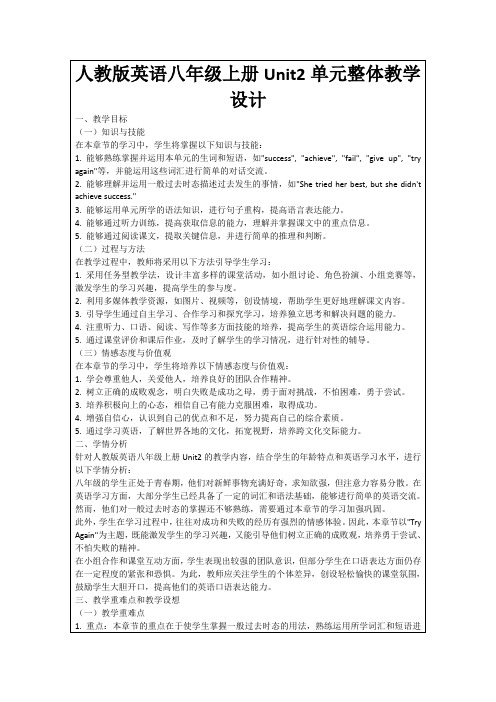
1.教学活动设计:
-教师引导学生回顾本节课所学内容,总结一般过去时态的用法和重点词汇。
-学生分享自己的学习心得,反思在学习过程中如何克服困难,勇于尝试。
2.教学过程:
-教师引导学生进行课堂小结,巩固学习成果。
-学生分享学习心得,教师给予鼓励和肯定,强化学生的学习动机。
-教师总结课堂内容,强调勇于尝试和面对失败的重要性,培养学生的积极心态。
2.能够理解并运用一般过去时态描述过去发生的事情,如"She tried her best, but she didn't achieve success."
3.能够运用单元所学的语法知识,进行句子重构,提高语言表达能力。
4.能够通过听力训练,提高获取信息的能力,理解并掌握课文中的重点信息。
5.能够通过阅读课文,提取关键信息,并进行简单的推理和判断。
1.教学活动设计:
-将学生分成小组,让他们针对课文内容进行讨论,探讨成功与失败的原因。
-设计小组讨论题目,引导学生结合自身经历,分享如何面对失败和挑战。
2.教学过程:
-学生在小组内展开讨论,共同分析课文中的成功与失败案例。
-学生分享自己的观点,讨论如何在面对失败时保持积极的态度,勇于尝试。
-教师巡回指导,关注学生的讨论过程,提供必要的语言支持。
在小组合作和课堂互动方面,学生表现出较强的团队意识,但部分学生在口语表达方面仍存在一定程度的紧张和恐惧。为此,教师应关注学生的个体差异,创设轻松愉快的课堂氛围,鼓励学生大胆开口,提高他们的英语口语表达能力。
三、教学重难点和教学设想
(一)教学重难点
1.重点:本章节的重点在于使学生掌握一般过去时态的用法,熟练运用所学词汇和短语进行交流,并能结合课文内容进行简单的推理和判断。
(新人教版)英语八年级上册 Unit 2 大单元教学设计
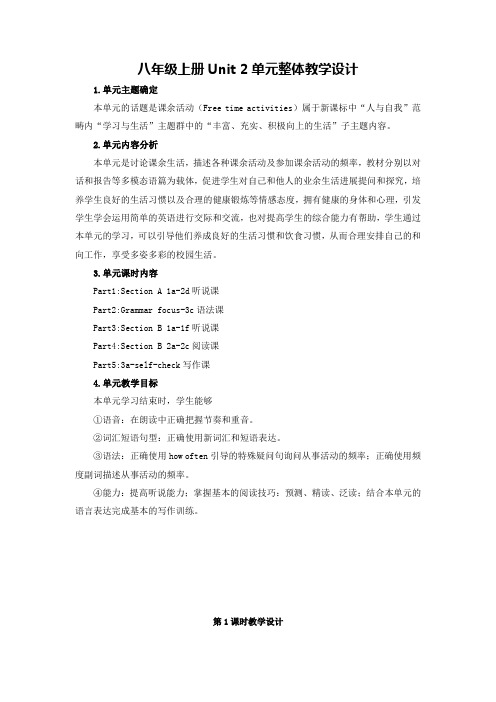
八年级上册Unit 2单元整体教学设计1.单元主题确定本单元的话题是课余活动(Free time activities)属于新课标中“人与自我”范畴内“学习与生活”主题群中的“丰富、充实、积极向上的生活”子主题内容。
2.单元内容分析本单元是讨论课余生活,描述各种课余活动及参加课余活动的频率,教材分别以对话和报告等多模态语篇为载体,促进学生对自己和他人的业余生活进展提问和探究,培养学生良好的生活习惯以及合理的健康锻炼等情感态度,拥有健康的身体和心理,引发学生学会运用简单的英语进行交际和交流,也对提高学生的综合能力有帮助,学生通过本单元的学习,可以引导他们养成良好的生活习惯和饮食习惯,从而合理安排自己的和向工作,享受多姿多彩的校园生活。
3.单元课时内容Part1:Section A 1a-2d听说课Part2:Grammar focus-3c语法课Part3:Section B 1a-1f听说课Part4:Section B 2a-2c阅读课Part5:3a-self-check写作课4.单元教学目标本单元学习结束时,学生能够①语音:在朗读中正确把握节奏和重音。
②词汇短语句型:正确使用新词汇和短语表达。
③语法:正确使用how often引导的特殊疑问句询问从事活动的频率;正确使用频度副词描述从事活动的频率。
④能力:提高听说能力;掌握基本的阅读技巧:预测、精读、泛读;结合本单元的语言表达完成基本的写作训练。
第1课时教学设计一、教学内容:Section A 1a-2d二、课型:听说课三、语篇研读What(主要内容):谈论课余简单的生活为主要话题,以对各类频度副词的学习和掌握,List(1a)看图列举周末活动;Listening(1b、2a、2b)主要是程涛正在讨论多久做这些活动,通过程涛的描述学习和理解频率的使用;Practice(1c、2c编对话关于周末有什么课余活动以及活动频率;Role-play(2d)Jack和Claire的对话,讨论下一周有哪些课余活动以及这些活动发生的频率,Claire丰富的课余生活。
【人教版】新目标八年级英语上册:Unit 2 单元说课稿

【人教版】新目标八年级英语上册:Unit 2 单元说课稿一. 教材分析新目标八年级英语上册Unit 2主要讲述了关于一般现在时的用法。
本单元包括两个部分:Section 1和Section 2。
Section 1主要介绍了一般现在时的基本结构和用法,通过一个关于家庭成员的对话和一个关于日常活动的,让学生理解和掌握一般现在时的构成和表示含义。
Section 2则通过一个故事和一个任务型阅读,进一步巩固一般现在时的用法,并引导学生运用一般现在时进行叙述和描述。
二. 学情分析八年级的学生已经掌握了英语学习的基本语法和词汇,具备一定的听、说、读、写能力。
但对于一般现在时的理解和运用,部分学生可能还存在一定的困难。
因此,在教学过程中,需要关注学生的个体差异,针对性地进行教学,帮助学生理解和掌握一般现在时的用法。
三. 说教学目标1.知识目标:学生能够理解一般现在时的概念、结构和用法,能够正确运用一般现在时进行叙述和描述。
2.能力目标:学生能够在日常交流中运用一般现在时,提高英语表达的能力。
3.情感目标:通过本单元的学习,学生能够培养对英语学习的兴趣,增强自信心。
四. 说教学重难点1.教学重点:一般现在时的结构、用法和意义。
2.教学难点:一般现在时的运用,特别是在具体情境中的运用。
五. 说教学方法与手段1.教学方法:采用任务型教学法、情境教学法和交际法,让学生在实际情境中理解和运用一般现在时。
2.教学手段:利用多媒体课件、图片、故事等教学资源,激发学生的学习兴趣,提高课堂参与度。
六. 说教学过程1.导入:通过一个与学生生活密切相关的场景,如询问学生家庭成员的姓名和年龄,引导学生进入一般现在时的学习。
2.新课呈现:通过一个关于家庭成员的对话和一个关于日常活动的,展示一般现在时的结构和用法。
3.实践环节:学生分组进行角色扮演,运用一般现在时进行对话,巩固所学知识。
4.任务型阅读:学生阅读一个关于故事的文章,回答相关问题,进一步理解一般现在时的用法。
【人教版】八年级英语上册 Unit 2 全单元英文教案

Unit 2 How often do you exercise?Language Goal 【语言目标】Talk about how often you do things:in this unit,students learn to talk about what things they do and how often they do these things.Knowledge Goals 【知识目标】Key Wordshousework,hardly,ever,once twice,full,maybe,least,junk,coffee,health,percent,online,although,through,mind,body,such,together,die,writer,dentist,magazine,however,than,almost,less,pointKey Phraseshow often,on weekends,go to the movies,hardlyever,twice a week,three times a week,be goodfor,at least,such as,less than,more than Key Sentences1. How often do you exercise?2.What do you usually do on weekends?Key Grammar1. The use of adverbs of frequency.2.“How often” cause of special questions andanswers.Ability Goals 【能力目标】1. Through the learning to gain the ability to talk about how often people do things.2.Write a report about how often people do things.Moral Goals 【情感目标】1. Keep a diary every day.2.Do more exercise and develop good habits to keep healthy.Teaching Time 【课时】Five periodsPeriod 1 Section A(1a-2d)Period 2 Section A(Grammar Focus-3c)Period 3 Section B(1a-1e)Period 4 Section B (2a-2e)Period 5 Section B (3a-Self Check)本单元的教学内容围绕“多久做一次运动”这一话题展开。
八年级英语上册-人教版-Unit 2 教学设计

八年级英语上册-人教版-Unit 2 教学设计一. 教材分析人教版八年级英语上册Unit 2主要介绍了日常生活中的一般疑问句,包括问候、介绍、询问时间、询问地点等场景。
通过本单元的学习,学生能够掌握一般疑问句的构成和用法,提高日常英语交流能力。
教材内容丰富,实用性较强,有利于激发学生学习兴趣。
二. 学情分析八年级的学生已经具备了一定的英语基础,对日常生活中的基本词汇和句型有所了解。
但部分学生对英语学习的兴趣不足,学习积极性有待提高。
此外,学生的英语水平参差不齐,教学过程中需关注不同层次学生的需求。
三. 教学目标1.知识目标:学生能够掌握一般疑问句的构成和用法,正确运用所学知识进行日常交流。
2.能力目标:提高学生的听、说、读、写能力,使其在实际情境中运用英语进行沟通。
3.情感目标:激发学生学习英语的兴趣,培养积极向上的学习态度。
四. 教学重难点1.重点:一般疑问句的构成和用法。
2.难点:一般疑问句在实际情境中的运用。
五. 教学方法1.情境教学法:通过设定各种日常生活中的情境,让学生在实际语境中学习、运用英语。
2.交际法:鼓励学生积极参与课堂互动,提高实际英语交流能力。
3.任务型教学法:通过完成各种任务,激发学生学习兴趣,巩固所学知识。
六. 教学准备1.教学素材:准备相关的图片、视频、音频等教学素材。
2.教学设备:投影仪、计算机、音响等教学设备。
3.作业布置:提前布置相关预习任务,让学生预习本节课的内容。
七. 教学过程1.导入(5分钟)利用图片、视频等素材,引入本节课的主题,激发学生学习兴趣。
同时,检查学生对上一节课内容的掌握情况。
2.呈现(10分钟)通过展示图片、实物等,呈现本节课的主要内容,引导学生观察、思考。
同时,用英语介绍一般疑问句的构成和用法。
3.操练(15分钟)将学生分成小组,进行角色扮演,模拟日常生活中的场景,运用一般疑问句进行交流。
教师巡回指导,纠正发音和语法错误。
4.巩固(10分钟)设计一些练习题,让学生填写或回答,巩固对一般疑问句的理解和运用。
人教版八年级上英语unit2教案
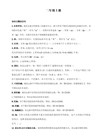
Step5.Groupwork
(1). Get the class to read the eight items in groups and try to understand the phrases.
② A: What’s the matter?
B: She/He has a cold/ sore throat /stomachache…
A: She/He should see a doctor/ have a rest/ take some medicine…
If your group get the most stars, your will be the winner.
Step4. Learn the illness
(1).Give the students an example:
Hold the head and say: I have a headache.
S: I have a headache.
Ss: You should go to see a doctor.
(5). Get the students to read the conversation in 3a and fill in the blanks. Then read the passage in groups or in pairs. Then ask the class to make a similar conversation and role play it in front of the class.
- 1、下载文档前请自行甄别文档内容的完整性,平台不提供额外的编辑、内容补充、找答案等附加服务。
- 2、"仅部分预览"的文档,不可在线预览部分如存在完整性等问题,可反馈申请退款(可完整预览的文档不适用该条件!)。
- 3、如文档侵犯您的权益,请联系客服反馈,我们会尽快为您处理(人工客服工作时间:9:00-18:30)。
领读频率副词,让学生快速认读。
川.Writing
1.Look at the picture. Discuss with your partn ers. Make a list of
the weeke nd activities.
3—Does he go shopp ing?—No, he n ever go shopp ing.
2)能了解以下语法:
频度副词及一般现在时简单谈论周末活动情况。
2.情感态度价值观目标:
通过本单元的学习,养成健康的饮食习惯,保证充足的睡眠时间,进行合理的运动锻炼,以
保持健康的体魄。培养学生的逻辑表述能力,激发学生的积极思维,并使学生互相了解,增
3.Check the an swers.
VD. Pair work
1.Ask one stude nt how ofte n he/she watch TV as a model.
T: Hi, S1. How often do you watch TV?
S1: I watch TV every day.
activities. Play the recording for the first time. Ss listen and
nu mber the activities [1-5].
3.Play the record ing for the sec ond time for the Ss to check the
an swers.
Work on 2b:
1.Tell Ss they will hear the recording again. This time, listen
and match the activities in 2a with how often Cheng Tao does them.
2.Ss listen and math the activities with the phrases.
3.Let some Ss act out their con versati ons.
W.Liste ning
Work on 2a:
1.Let Ss read the phrases in the chart.
2.Tell Ss that Cheng Tao is tak ing about how ofte n he does these
板 书 设 计
Unit2Sectio n A 1(1a-2d)
—What does he do on weeke nds?
—He usually watches TV.
—How ofte n do you watch TV?
—I watch TV every day.
—Does he go shopp ing?
(2)教师出示动词卡片watch TV,read books,exercise,swimplay
football、go shopping、go to movies让学生回答。
(3)点击鼠标屏幕上出现频率副词及相关的百分比。
always(100%)usually(80%)ofte n (30-50%)
学校
三中
学科年级
八年英语
课型
新授课
课时
1
主备人
张晓林
检查人
教研组长
设计时间
2014.8
修改时间
2014.9
课题:Unit2How ofte n do you exercise? Section A 1 (1a-2d)
教学目标:1.语言知识目标:
1)能掌握以下单词:housework, hardly, ever, hardly ever, once, twice, Internet,
program, full, swing, swing dance, maybe, least, at least
能掌握以下句型:
1一What does he do on weekends?—He usually watches TV.
2—How ofte n do you watch TV?—I watch TV every day.
2.Let some Ss read out their activities. Let other Ss add more activities.
IV. Liste ning
1.Let a student read the words aloud. Make sure all the Ss know
进友谊,加强人际交往,以形成良好的人际关系。
教学重点:1)对6个频度副词细微差异的理解及使用。
2)弄清一般现在时在不同人称下动词形式及提问的变化。
教学难点:1)第三人称单数谓语动词在此核心句型中的运用。
2)谈论课余时间的各项活动,以及初步认识和使用频率副词。
课前准备:PPT and Learni ng Guide
—No, he n ever go shopp ing.
I . Lead in
Talk about your last weekend's activitieห้องสมุดไป่ตู้.
n . Presentation
(1)教师问:“What do you usually do on weekends ?”(并且板书)
让学生根据自己的实际回答I usuallyon weeke nds.
4.Play the tape for the second time for the Ss to check the answers.
V.Pair work
1.Act out the conversation with a student.
2.Let Ss talk about the pictures in 1a in pairs.
the meaning of the words.
2.Tell Ss to liste n and write the letters from the picture above
on the line below.
3.Play the tape for the first time. Ss listen and fill in the blanks.
